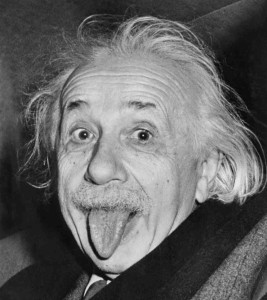Double Mitzvah – Vayetzei

Written by Maya B. Alma. Maya B. Alma is Jewrotica’s new Double Mitzvah columnist!
Check out last week’s column, Double Mitzvah – Toldot.

When a man sits with a pretty girl for an hour, it seems like a minute. But let him sit on a hot stove for a minute and it’s longer than any hour. That’s relativity.
– Albert Einstein
 First: yes, he really did say it. Wrote it, in fact, as the abstract to a 1938 paper. Among the things I’ve always loved about Albert Einstein is his delicious sense of humor. I mean…this is the guy whose name is synonymous with “genius,” and just look at him on his seventy-second birthday!
First: yes, he really did say it. Wrote it, in fact, as the abstract to a 1938 paper. Among the things I’ve always loved about Albert Einstein is his delicious sense of humor. I mean…this is the guy whose name is synonymous with “genius,” and just look at him on his seventy-second birthday!
Among the things I’ve always loved about this week’s parashah, Vayetzei, is its obvious understanding of relativity, and the way in which it uses the very same example as Einstein did to explain it: “So Jacob served seven years for Rachel and they seemed to him but a few days because of his love for her” (Genesis 29:20).
Let’s remember what transpires before we learn of Jacob’s love for Rachel: he has left his family in the Land of Israel, both to stay clear of his brother Esau’s rage and to please his mother Rebecca, who wishes for him to marry a “member of the tribe.” He dreams the famous “Jacob’s Ladder” dream (Genesis 28), and then….
Jacob “lifted his feet” (i.e., journeyed on) and came to the land of the Easterners. He looked, and behold: a well in the open. Three flocks of sheep were lying there beside it, for the flocks were watered from that well. The stone on the mouth of the well was large. When all the flocks were gathered there, the stone would be rolled from the mouth of the well and the sheep watered; then the stone would be put back in its place on the mouth of the well.
Jacob said to them, “My friends, where are you from?” And they said, “We are from Haran.” He said to them, “Do you know Laban the son of Nahor?” And they said, “Yes, we do.” He continued, “Is he well?” They answered, “Yes, he is; and there is his daughter Rachel, coming with the flock.” He said, “It is still broad daylight, too early to round up the animals; water the flock and take them to pasture.” But they said, “We cannot, until all the flocks are rounded up; then the stone is rolled off the mouth of the well and we water the sheep.”
While he was still speaking with them, Rachel came with her father’s flock; for she was a shepherdess. And when Jacob saw Rachel, the daughter of his uncle Laban, and the flock of his uncle Laban, Jacob went up and rolled the stone off the mouth of the well, and watered the flock of his uncle Laban. Then Jacob kissed Rachel, and broke into tears (Genesis 29:1-11).
Jacob, like his father before him, meets the love of his life in a “love at first sight” moment, performing a super-human feat of strength in rolling away a large stone from the mouth of the well (endorphins are powerful things!). His kisses and his tears suggest a man who feels deeply. The years which pass like days as he works off the bride-price only confirm that aspect of his character. Jacob is a romantic.
We are taught, and rightly so, that “love” in Jewish thought goes far beyond romance. While romance may be present, it need not be so. Our love of God (Deuteronomy 6:5) and our love of neighbor (Leviticus 19:18) are not of the gooey variety, but find their expression in right conduct. Rabbi Brad Artson has written beautifully on Judaism’s “Covenantal Love,” which, he notes
is very different than popular culture’s portrayal of love, in which love is the pitter-patter of a heart, but that pitter-patter only lasts as long as it takes to cook a pop tart. Five minutes later, our attention drifts to some other infatuation. So we live in a culture with all these romances, passionate beginnings and frequent flammable finales. We read about the various stars and their love affairs, and we can read about their breakups and their new love affairs. That superficial, provisional appetite is not Covenantal love.
No argument from me, for the most part. But the fact that our faith points us toward a love that goes well beyond the “pitter-patter of a heart” does not mean that we shouldn’t enjoy the quickening of the pulse, the pounding (and not merely the pitter-patter) in the chest. What a gift it is to experience all of that in the context of an ever-growing, ever-deepening covenantal love, perhaps to look back over an enduring relationship through the eyes of Golde and Tevye. Indeed, “after twenty-five years, it’s nice to know.”
But on this Shabbat, on this website, let’s take a moment to praise raw chemistry of the sort on display in the verses above. Let’s celebrate the passionate beginning, the racing heart, the kisses, the joyful tears, the days which pass like mere seconds. To time-bending love! Lechayim!













Pingback: Double Mitzvah – Vayishlach - Jewrotica